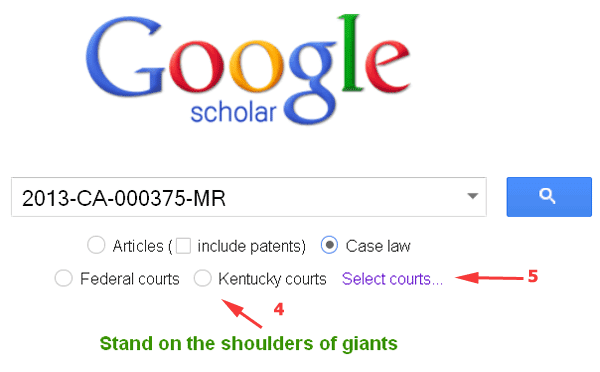Folks with access to Westlaw or Lexis don't have these problems, but those of us who insist upon free access to basic legal authorities have to be adaptable. All Kentucky Court of Appeals opinions since 1996 and all Kentucky Supreme Court opinions since 1999 are available online, and are searchable, through the Kentucky Court of Justice web site. The web
search function is very powerful and useful.
To search for a specific case, it is necessary to visit either the
Clerk of the Supreme Court docket search page OR the
Clerk of the Court of Appeals docket page online. There one can search by attorney name, appellate case number, Circuit Court case number or by any of the litigant's names. Supreme Court case numbers, such as 1996-
SC-001085-MR, are identified by the 'SC' after the year designation, whereas Court of Appeals case numbers contain a 'CA' at that same location.
Obviously, one must search the Supreme Court's docket for Supreme Court case numbers and the Court of Appeals' docket for Court of Appeals case numbers. For such a docket search online, the only significant parts of the case number are the year and the number, without leading zeros. The trailing letters, 'MR', 'WC' etc. in the case number merely indicate the type of case it is and they are not used in the docket search.
Whether one uses the opinion text search function or the docket search functions, one ends up with a PDF file of the court's slip opinion. The court's web site warns:
"This site will give you immediate access to opinions, in a PDF format, as they are rendered. When finality is entered in a case, the final opinion will replace the rendered copy on the site. Finality and publication status will be shown on the first page of the opinion."
Although it is true that court opinions are made public before those decisions are final, the finality of an opinion is
not always marked on the first page of the online slip opinion. In order to verify the finality of any ambiguous online opinion, it is necessary to return to the relevant court clerk's docket search.
Generally, the finality of Kentucky appellate decisions is controlled by Civil Rule 76.30
Effective date of opinions, which reads in part:
(1) Scope of Rule.
This Rule 76.30 applies to any final decision of an appellate court styled an “Opinion.” A decision styled an “Opinion and Order” is an order, and is governed by Rule 76.38.
(2) Finality.
(a) An opinion of the Supreme Court becomes final on the 21st day after the date of its rendition unless a petition under Rule 76.32 has been timely filed or an extension of time has been granted for that purpose. An opinion of the Court of Appeals becomes final on the 31st day after the date of its rendition unless a petition under Rule 76.32 or a motion for review under Rule 76.20 has been timely filed or an extension of time has been granted for one of those purposes.
(b) In the event of a timely motion for review under Rule 76.20, the opinion becomes final immediately upon denial of the motion.
(c) In the event of a timely petition under Rule 76.32, (i) if it is in the Supreme Court and is denied, the opinion becomes final immediately upon such denial, but if the petition is granted and a new or revised opinion is rendered, the new or revised opinion becomes final on the 21st day after the date of its rendition unless otherwise ordered, or unless a further petition under Rule 76.32 has been timely filed or an extension of time has been granted for that purpose; (ii) if it is in the Court of Appeals and is denied, the opinion becomes final on the 31st day after the date the petition was denied unless a motion for review under Rule 76.20 has been timely filed; (iii) if it is in the Court of Appeals and is granted, and a new or revised opinion rendered, the new or revised opinion becomes final on the 31st day after the date of its rendition unless otherwise ordered, or unless a further petition under Rule 76.32 or a motion for review under Rule 76.20 has been timely filed or an extension of time has been granted for one of those purposes.
(d) Unless otherwise ordered, (i) in no event shall an opinion become final pending final disposition of a timely petition under Rule 76.32 or a timely motion for review under Rule 76.20; and (ii) in every case it shall become final when no such motion or petition has been filed within the time allowed for that purpose. * * * *
The lesson is that decisions of the Kentucky Court of Appeals and the Kentucky Supreme Court are
never final at the time the opinions are first made public online, the finality of an opinion
might not be apparent upon the face of the slip opinion itself and the finality of any given opinion may remain in limbo for many months after the opinion is made public. The way to know for sure is to check the relevant court clerk's docket details.




